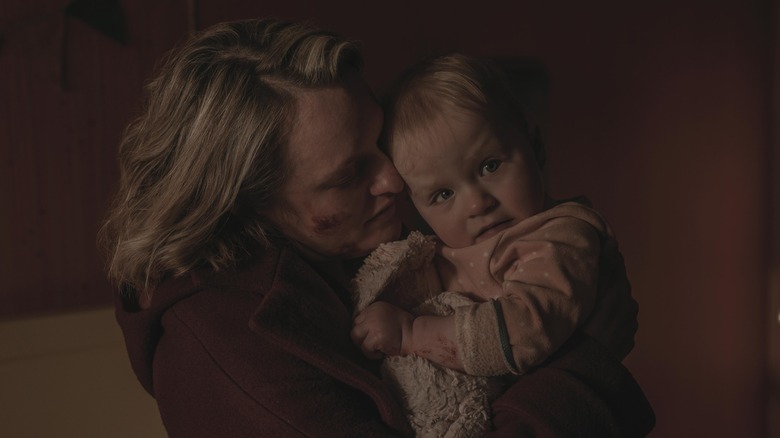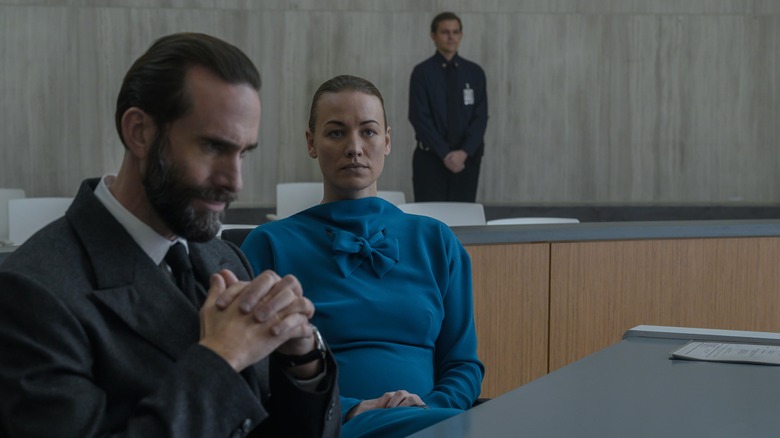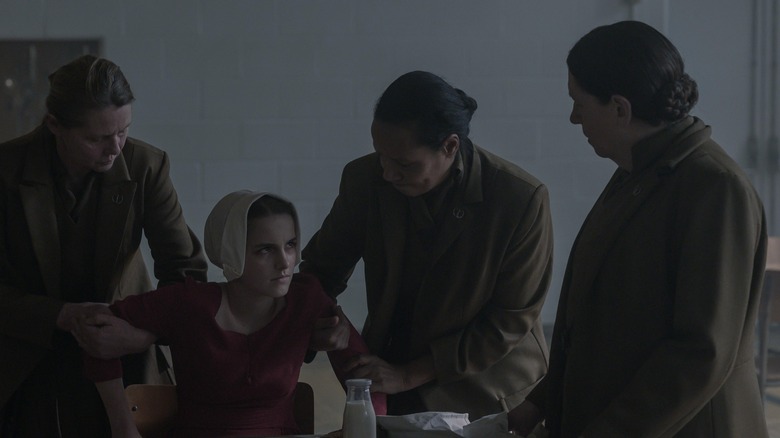The Handmaid's Tale Season 4 Ending Explained
"The Handmaid's Tale" Season 4, which began airing on Hulu in April 2021, drastically alters the course of Hulu's acclaimed dystopian series. After fighting to bring down Gilead from the inside, protagonist June Osborne (Elisabeth Moss) escapes to Canada and is reunited with her friends, husband Luke (O-T Fagbenle), and baby daughter Nichole. But assimilating back into ordinary life proves incredibly difficult for June, leaving her loved ones and viewers to wonder what healing and "moving on" from Gilead could possibly look like for her. June is still preoccupied with rescuing her older daughter Hannah from Gilead's clutches, and longs for revenge against those who had directly oppressed her during her time as a Handmaid, particularly the now-imprisoned Fred (Joseph Fiennes) and Serena Waterford (Yvonne Strahovski).
While the Waterfords started off the season at odds, they're forced to come back together to devise their freedom from Canadian authorities after Serena discovers she is somehow pregnant. But their freedom is precarious, and their facade as an ideal Gilead family has been obliterated. More than any other season, this installment of "The Handmaid's Tale" asks how we move forward from times of intense trauma, how we seek restorative justice, and what it means to heal. Here's the ending of "The Handmaid's Tale" Season 4, explained.
June takes matters into her own hands
After narrowly surviving a gunshot wound at the beginning of Season 4, June makes it to Chicago and is brought to Canada by her best friend Moira (Samira Wiley). But as this season explores through June's journey and experiences, Gilead lives within its victims — even after they escape its borders. She becomes consumed with a desire for vengeance, emotionally detaching from her loved ones to plot the Waterfords' takedown as a proxy for getting revenge on Gilead as a whole. By the finale, when June learns that Fred and Serena will likely be freed for giving the Canadian government Gilead intelligence secrets, she takes matters into her own hands and arranges for Fred to be captured and taken to the "No Man's Land" between Canada and Gilead.
Recreating the Salvaging, June and several other former Handmaid's brutally murder Fred in the woods and leave his body hanging on The Wall. However, June could face heartbreaking personal consequences for her revenge plot, and even tells Luke she'll leave after he realizes what she's done. She has powerful contacts within Gilead like Commander Lawrence (Bradley Whitford) and her lover Nick Blaine (Max Minghella) who could bring her Hannah, but her self-destructive, untreated trauma could prevent her from bringing about actual change. June's need for vengeance is understandable... but it could lead to horrible ramifications down the road.
The Waterfords get a taste of their own medicine
Although Serena and Fred are forced to put up a united front throughout Season 4 in hopes of escaping Canadian custody and living freely with their son, their relationship gets even more strained as the series progresses. Fred has a renewed interest in Serena now that she's carrying his son, while Serena is moved by the pro-Gilead protesters who applaud her on their way to June's testimony.
The Waterfords' personal conflicts have always shown how people who directly work to uphold patriarchal structures are often hurt by the very laws and expectations they helped create. This theme comes full-circle in Season 4, as Serena faces the possibility of being separated from her son at birth and being turned into a Handmaid should she return to Gilead — a dark mirror to Serena's violation of June and attempt to steal baby Nichole as her own. Fred, who hides behind chivalry and theological goodness to cover up his spineless misogyny, is ultimately taken down by his own blindness to women's capabilities and complexities. He easily allows June to coax him into believing she still cares for him, and is killed through a Gilead ritual he helped create. Next season, Serena will likely find herself truly on her own for the first time, as she reckons with the world she chose for herself, and how she subjugated other women in the process.
June's Canadian family charts a path forward
While June's Season 4 character arc shows how unprocessed trauma can consume you and change your perception of the world in major ways, her loved ones in Canada spend the season attempting to find new ways forward. Luke, Moira, and Emily (Alexis Bledel) continue working to help Gilead refugees enter Canada and begin new lives outside of the theocracy. They're also helping nurture the next generation, as Luke and Moira are Nichole's primary caregivers and Emily continues reconnecting with her son Oliver. Moira also gets a second chance at love through her burgeoning relationship with her headstrong coworker Oona (Zawe Ashton).
Meanwhile, a recently freed Rita (Amanda Brugel) grapples with unlearning all the behaviors Gilead has taught her, such as her automatic tendency to serve people through cooking and housework. One of the most striking scenes of the season is her work with a little boy who was recently freed from Gilead, but has no memories of a time before then and struggles to adjust. June's friends and family are fighting for the possibility of a post-Gilead world, but the most well-adjusted characters are still struggling to accept that such a world may never truly exist, a journey which will surely continue next season as the characters grapple with the new society they've worked to craft together.
The cracks in Gilead's foundation are showing
"The Handmaid's Tale" Season 4 spent less time in Gilead than ever before, but the scenes fans got reinforced how precarious the country's rigid system is, and how this uncertainty affects the next generation. A new recurring character is Esther Keyes (Mckenna Grace), a 14-year-old Wife who hopes to get revenge on the Commanders who have brutally assaulted her. She's punished and turned into a Handmaid alongside June's friend Janine (Madeline Brewer), but Aunt Lydia (Ann Dowd) is rapidly losing control over the Handmaids, who resist her with a food strike. Season 5 could mark a full-on Handmaid revolution if things go well... or as well as they can go in Gilead.
The men left in Gilead are also torn between standing with their rocky new country and accepting the growing revolution. Commander Lawrence, who was the original architect of Gilead, initially asks for 10 Gilead child refugees in exchange for Hannah. Later, he went against the grain and helped her destroy Fred. And Nick continues working for Gilead throughout the season, but seemingly defects after reuniting with June and their baby daughter. Season 5 is bound to push the "Handmaid's Tale" characters to the brink even more, and challenge what exactly freedom could look like in a world of patriarchal violence. Blessed be the fruit.




